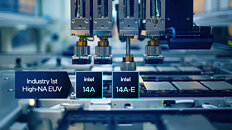
Intel Forecasts Foundry Break‑Even in 2027 as 14A Node Debuts
Intel says its struggling Foundry division will finally break even in 2027, just as its advanced 14A process comes online. The announcement came during the J.P. Morgan Global Technology, Media & Communications Conference, where CFO David Zinsner outlined the plan to offset years of quarterly losses. Intel has been pouring billions of dollars into new fabs and equipment as it races to keep pace with TSMC and Samsung. Its first milestone is the 18A process, whose first product, codenamed Panther Lake, will arrive in client PCs late in 2025, with volume production following in 2026. Intel also plans to use 18A for its next Xeon "Clearwater Forest" server chips and offer it to a small set of external partners to prove the technology's readiness. "We have to start by using our own chips," Zinsner explained. "Once we show that Panther Lake and Clearwater Forest perform as expected, we'll see more interest from outside customers for 18A, 18A‑P, and then 14A."
He acknowledged that initial adoption is low, but expressed confidence that proven performance will drive committed volume. A key part of the strategy is the use of High‑NA EUV lithography at 14A. Zinsner admitted this will raise equipment costs at first, but he believes the improved transistor density and power efficiency will more than make up for the investment, boosting margins and factory utilization. Intel's path to break even also incorporates revenue from mature nodes such as Intel 16/12, advanced packaging services, and collaborations with UMC and Tower. Under its "smart capital" model, the company will balance internal wafer demand with third‑party work, maintaining flexibility and cost discipline. With a relatively modest external revenue target (for a cash-bleeding foundry), low to mid single‑digit billions per year, Intel Foundry aims to reach break‑even in 2027 and move into sustained profitability soon afterward. By 2027, Intel 14A node and ehnaced the 1.8 nm-class 18A-P(T) node will also complement these break-even efforts.
He acknowledged that initial adoption is low, but expressed confidence that proven performance will drive committed volume. A key part of the strategy is the use of High‑NA EUV lithography at 14A. Zinsner admitted this will raise equipment costs at first, but he believes the improved transistor density and power efficiency will more than make up for the investment, boosting margins and factory utilization. Intel's path to break even also incorporates revenue from mature nodes such as Intel 16/12, advanced packaging services, and collaborations with UMC and Tower. Under its "smart capital" model, the company will balance internal wafer demand with third‑party work, maintaining flexibility and cost discipline. With a relatively modest external revenue target (for a cash-bleeding foundry), low to mid single‑digit billions per year, Intel Foundry aims to reach break‑even in 2027 and move into sustained profitability soon afterward. By 2027, Intel 14A node and ehnaced the 1.8 nm-class 18A-P(T) node will also complement these break-even efforts.

















